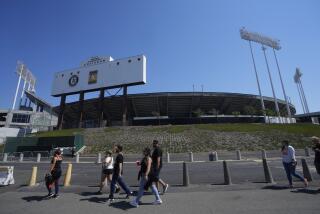Oakland OKs Raider Deal--Just Barely
OAKLAND — The Oakland City Council narrowly ratified approval of a $660-million deal to bring the Los Angeles Raiders back to town, despite growing community opposition and a petition drive to put the plan to voters.
Meeting before several hundred spectators in a downtown theater, the council voted 5 to 3, with one member absent, to proceed with the most lucrative package ever given a sports team to relocate.
Opponents had hoped the council would rescind its support in response to mounting anxiety over the potential financial risks to the city.
“Why should we mortgage our future and our children’s future for the Raiders?” Jerry Adams 48, a local schoolteacher, asked the council. “What happens if the Raiders play poorly and you cannot sell the projected number of tickets and luxury boxes? Who will pay?”
On Monday, a group headed by the former chairman of the Alameda County Democratic Party launched a petition drive to put the package to a vote in November and threatened to go to court if necessary to block the deal.
At a special meeting March 5, the City Council and Alameda County supervisors gave initial approval to the package. But a second council vote was required because part of the package was adopted as a city ordinance.
Under the 15-year package, the city and county would sell tickets to Raiders games and share the proceeds with team owner Al Davis, who would be guaranteed at least $28 million in ticket revenue annually. The city and county would keep half of the concessions and parking revenues, and Davis would get all television proceeds, currently about $32 million annually.
The city and county also would spend about $54 million to expand the Oakland-Alameda County Coliseum, where the team would play.
Because the city and county are guaranteeing the deal, taxpayers would have to pick up the cost, unless the football team consistently drew at least 57,000 fans to the expanded 63,500-seat stadium. If all tickets were sold over the 15 years of the contract, county taxpayers could earn $51 million. But if 20% of the best tickets were unsold, taxpayers would be liable for $23 million.
More to Read
Go beyond the scoreboard
Get the latest on L.A.'s teams in the daily Sports Report newsletter.
You may occasionally receive promotional content from the Los Angeles Times.










